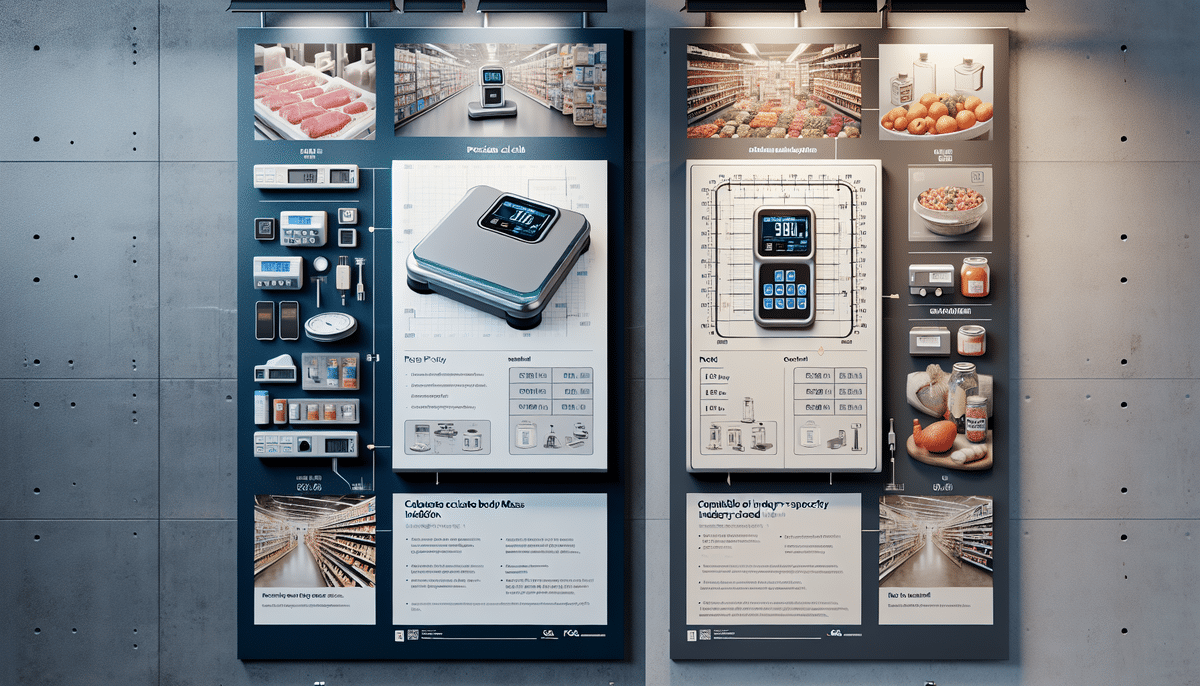PEC Scales vs CAS RW-L Series: A Comprehensive Comparison
If you're in the market for a high-quality weighing scale, you may have come across two popular choices: PEC Scales and CAS RW-L Series. Both are renowned for their precision, durability, and user-friendliness. But which one is better for your specific application? Let's delve into the features, specifications, and performance of both scales to help you make an informed decision.
Introduction to PEC Scales and CAS RW-L Series
PEC Scales and CAS RW-L Series are prominent brands in the weighing industry, offering a wide range of scales tailored to different needs. PEC Scales is a Texas-based company specializing in weighing solutions for medical, veterinary, industrial, and food applications. Conversely, the CAS RW-L Series hails from South Korea, serving the retail, industrial, and commercial sectors.
Both brands provide options ranging from benchtop and digital floor scales to crane scales, catering to diverse industries including healthcare, food processing, retail, and logistics.
Features and Specifications
PEC Scales
PEC Scales are distinguished by their advanced features and high precision. Key specifications include:
- Precision Load Cells: Offer accurate readings with a resolution of up to 0.001g.
- Capacity Range: From 0.01g to 5000g, suitable for various applications.
- Specialized Scales: Veterinary scales with animal-specific features and medical scales equipped with BMI calculation and memory recall.
- Connectivity: USB, RS-232, and Ethernet ports for seamless data transfer.
- Durability: Constructed with high-quality materials to ensure longevity in industrial and laboratory settings.
PEC Scales also provide comprehensive software for data management, facilitating tracking and analysis of weighing data.
CAS RW-L Series
The CAS RW-L Series stands out with its robust build and user-centric features:
- LED Displays: Large, bright displays ensure visibility even in low-light conditions.
- User-Friendly Functions: Includes tare weight, automatic shut-off, and overload protection.
- Build Quality: Stainless steel housing resistant to rust and corrosion.
- Capacity Range: 1kg to 300kg, making them versatile for various sectors.
- Portability: Built-in rechargeable batteries allow use in areas with limited power supply.
These scales are ideal for settings like outdoor markets, farms, and warehouses where portability and durability are essential.
Design and Build Quality
Both PEC Scales and CAS RW-L Series exhibit superior design and build quality, but with distinct differences:
- PEC Scales: Feature sleek, compact designs suitable for modern environments such as hospitals and laboratories. Their high-resolution displays enhance readability and ease of use.
- CAS RW-L Series: Boast a traditional design with large platforms for added stability. The rugged stainless steel construction ensures durability in demanding environments.
Precision Edge: PEC Scales offer superior precision due to their advanced load cell technology, ensuring accurate readings even for minimal weights. While CAS RW-L Series scales are accurate, they may require more frequent calibration to maintain their precision.
Performance and Accuracy
In terms of performance:
- PEC Scales: Known for consistent accuracy and reliability, utilizing electromagnetic balance sensors for sensitive measurements.
- CAS RW-L Series: Provide quick and accurate weight measurements with high-performance load cells, ensuring reliability over long-term use.
Both scales are built to withstand heavy usage, but PEC Scales generally offer higher precision suitable for specialized applications.
Accuracy Comparison
Accuracy is a critical factor in weighing scales:
- PEC Scales: Offer a repeatability of ±0.002g, ensuring highly precise measurements unaffected by environmental factors like humidity and temperature.
- CAS RW-L Series: Provide a repeatability of ±5g, which is reliable for general applications but less precise than PEC Scales.
For reference, according to a study published in Scientific Reports, high precision in medical scales can significantly impact diagnostic accuracy.
Ease of Use
Both scales are designed for user-friendliness:
- PEC Scales: Equipped with intuitive software for data entry, automatic calibration, accumulative weighing, and auto-save functions.
- CAS RW-L Series: Feature zero-tracking and display hold functions, simplifying the weighing process and enhancing efficiency.
Enhancing user experience is crucial, as highlighted by research from the National Institutes of Health, which emphasizes the importance of intuitive interfaces in reducing user error.
Maintenance Requirements
Maintenance is minimal for both scales:
- PEC Scales: Designed with easy-to-clean surfaces and self-diagnosing features that alert users to potential issues.
- CAS RW-L Series: Include overload protection to safeguard the load cell and ensure longevity.
Regular maintenance ensures optimal performance and longevity, as supported by guidelines from the Quality Magazine.
Customer Support
Reliable customer support can greatly influence user experience:
- PEC Scales: Offer extensive technical support and training programs, with knowledgeable staff ready to assist.
- CAS RW-L Series: Provide 24/7 helplines and a robust dealer network to ensure prompt assistance.
Effective customer support is essential for addressing issues promptly, as noted by Harvard Business Review, which links strong customer service to increased customer loyalty.
Price Comparison
Cost is a significant consideration:
- PEC Scales: Generally more expensive due to higher precision and specialized features, making them suitable for industries requiring exact measurements.
- CAS RW-L Series: More affordable, ideal for businesses and homeowners seeking reliable scales on a budget.
When evaluating cost, it's important to consider the total cost of ownership, including maintenance and operational costs.
Pros and Cons
Pros and Cons of PEC Scales
- Pros:
- Higher precision and accuracy.
- Advanced features for data management.
- Durable and reliable build.
- Cons:
- Higher cost.
- May be excessive for applications not requiring high precision.
Pros and Cons of CAS RW-L Series
- Pros:
- Affordable pricing.
- Robust and durable construction.
- User-friendly features and portability.
- Cons:
- Lower precision compared to PEC Scales.
- Might require more frequent calibration.
Suitable Applications
Applications Suitable for PEC Scales
PEC Scales are ideal for applications that demand high precision, including:
- Medical and pharmaceutical industries.
- Veterinary practices.
- Food processing and quality control.
- Research and development laboratories.
- Jewelry and precision manufacturing.
Applications Suitable for CAS RW-L Series
CAS RW-L Series are well-suited for applications requiring reliable and durable scales, such as:
- Retail and grocery stores.
- Industrial and commercial warehouses.
- Farming and agriculture for weighing crops.
- Shipping and logistics for package weighing.
Conclusion: Which Scale is the Better Choice?
Both PEC Scales and CAS RW-L Series offer unique advantages tailored to different needs. The choice between the two depends on your specific requirements:
- Choose PEC Scales if:
- You require high precision and accuracy for specialized applications.
- Your industry demands advanced features and reliable data management.
- You are willing to invest in higher-quality, durable scales.
- Choose CAS RW-L Series if:
- You need affordable, reliable scales for general applications.
- Your operations involve environments where durability and portability are essential.
- You prefer scales with user-friendly features and minimal maintenance.
Evaluate your weighing needs, budget, and specific application requirements to determine the best fit. Consulting with industry professionals can also provide valuable insights to guide your decision.






















